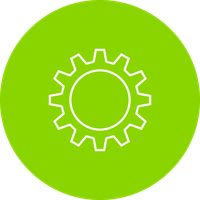
ITEA Impact story
OPTIMUM

Offering greater efficiency, safety and usability in future smart factories






Impact highlights
- The innovative assistance functions created in the OPTIMUM project will significantly reduce assembly times in semi-autonomous processes, where an 18% reduction was already achieved during a proof of concept. In real industry applications, even larger efficiency increases are expected.
- The development of a globally standardised Open Platform Communication Unified Architecture (OPC UA) data model for cranes and hoists (OPC 40020-1 companion specification) was actively driven by the project partners and evaluated in the OPTIMUM project. The finalisation of this companion specification makes it possible to create flexible, standardised, interoperable and secure solutions across the entire material handling domain, as well as beyond in mechanical and plant engineering.
- In August 2023, Demag supplied a crane to the Fraunhofer Institute for Factory Operation and Automation (IFF) in Magdeburg for its new research facility, the Elbfabrik.
- For German SME Tarakos, OPTIMUM’s results have so far led to the acquisition of two industrial customers from the crane sector for software licenses and services.
- BEIA has developed its IoT telemetry solution with OPC UA for cranes to be used by NAVROM, the biggest river shipping company in Romania.
In today’s factories, machines such as cranes are typically operated
manually using heterogeneous hardware. These are usually not interoperable and diverse control
environments are used; static machine configurations also make evolution hard to achieve. In a global
market with strong competition, Industry 4.0 concepts like greater software modularity, interoperable
frameworks and Industrial Internet of Things (IIoT) must be embraced to enable truly smart
factories.
The ITEA project OPTIMUM, which ran from 2017 to 2021 and gathered 17 partners from Germany, Türkiye,
South Korea, Romania, Spain and the United Kingdom, enabled machines of different kinds and from
different manufacturers to communicate with each other and their operators, improving the safety of
workers and equipment. This was ground-breaking because previously only machines from the same
manufacturer could
communicate with each other at a reasonable cost and engineering effort.
Project results
OPTIMUM established a seamless integration of real-time machine-to-machine (M2M) communication with distributed control, localisation awareness, 3D engineering and visualisation for smart factory applications. This innovative approach was supported by a common Industrial Internet of Things (IIoT) platform and a Distributed Control Platform (DCP). By incorporating integrated context and location awareness, the project achieved better control and support for industrial processes. These advancements were validated through 15 demonstrators deployed across four countries. These demonstrators showcased diverse use cases, ranging from compact mobile robots and table-top models to laboratory prototypes and real-world factory applications featuring assembly processes. Of the eight patent ideas generated, three have already been registered at the national level, laying a foundation for future market introduction. The remaining ideas are currently under review or undergoing the submission process.
Significant advancements were made in equipping cranes, forklifts, and autonomous vehicles with intelligent assistance functions, such as “come to me,” “go-to,” and “follow machine.” These features will make machines and processes smarter, contributing to improved resource utilisation and overall sustainability. Moreover, users of the software and applications developed under the project can look forward to safer and more flexible material handling processes.
Exploitation
The distributed control architecture and M2M communication methods developed in OPTIMUM have been successfully carried forward into various Konecranes and Demag development projects. One notable outcome is the Electric 2.0 project, which is set to deliver an innovative, busbased crane control architecture. In addition, OPTIMUM’s cybersecurity-related topics have been deepened and continued in the SUSTAIN research project. This new initiative brings together five OPTIMUM partners – Demag, IFAK, IOTIQ, NXP and the University of Rostock – to focus on the security certification of the OPTIMUM IoT Kernel.
Several partners have already exploited the results of the OPTIMUM project. For instance, Demag delivered an innovative crane, known as the OPTIMUM Crane, to the Fraunhofer Institute for Factory Operation and Automation (IFF). Featuring advanced assistance functions developed by the project partners, this crane plays a pivotal role at the IFF-Elbfabrik, a research and demonstration hub for Industry 4.0 solutions. Here, the OPTIMUM Crane will play a key role in smart factory scenarios, facilitating collaboration between machines and humans in a shared environment. NXP is developing an integrated hardware solution based on OPTIMUM results to serve as an evaluation kit for the industrial market.
Meanwhile, Tarakos has significantly enhanced its software solutions (taraVRbuilder and taraVRcontrol), and optimised the planning of material handling processes involving cranes. These upgraded software tools were launched to the market in August 2022 and are also being sold to the Fraunhofer Institute for use in the Elbfabrik. The consortium’s achievements exceeded expectations, advancing from an initial goal of two market approaches to the development of 38 short-, mid-, and long-term exploitation strategies aimed at bringing these innovations to market.
The collaborative spirit fostered by the OPTIMUM project is set to drive lasting benefits in efficiency, competitiveness, safety, and sustainability for many years to come.
More information
Download OPTIMUM Impact storyRelated projects
OPTIMUMOrganisations
BEIA Consult International (Romania)Demag Cranes & Components GmbH (Germany)
Institut for Automation und Kommunication (IFAK) (…
NXP Semiconductors Germany GmbH (Germany)
University of Rostock (Germany)
tarakos GmbH (Germany)

